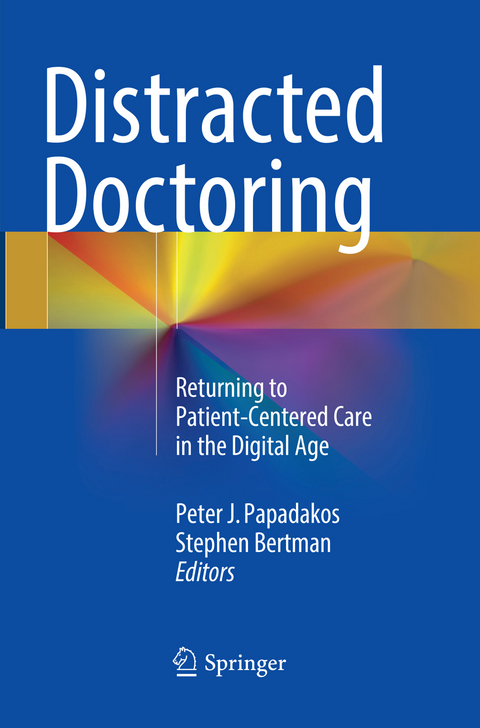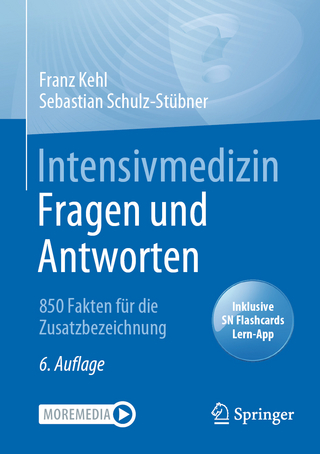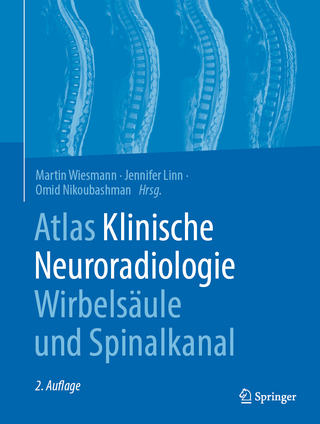
Distracted Doctoring
Springer International Publishing (Verlag)
978-3-319-84000-0 (ISBN)
Examining-room computers require doctors to record detailed data about their patients, yet reduce the time clinicians can spend listening attentively to the very people they are trying to help. This book presents original essays by distinguished experts in their fields, addressing this critical problem and making an urgent case for reform, because while electronic technology has revolutionized the practice of medicine, it also poses a unique challenge to health care. Smartphones in the hands of doctors and nurses have become dangerously seductive devices that can endanger their patients.
Distracted Doctoring is written for anesthesiologists and surgeons, as well as general practitioners, nurses, and health care administrators and students. Chapters include Electronic Challenges to Patient Safety and Care; Distraction, Disengagement, and the Purpose of Medicine; and Managing Distractions through Advocacy, Education, and Change.Peter J. Papadakos, MD, is Professor of Anesthesiology, Surgery, Neurosurgery, and Neurology at the University of Rochester Medical Center in New York, where he serves as Director of the Division of Critical Care, and is Professor of Respiratory Care and Medical Director at the State University of New York at Genesee Community College. He is the co-editor of Encyclopedia of Trauma Care (Springer) as well as the author of numerous monographs, book chapters, original papers, and reviews. Stephen Bertman, PhD., is Professor Emeritus of Languages, Literatures, and Cultures at Canada's University of Windsor. He is the author of Hyperculture: The Human Cost of Speed (Praeger), The Healing Power of Ancient Literature (co-edited with Dr. Lois Parker; Cambridge Scholars Press), The Genesis of Science: The Story of Greek Imagination (Prometheus), and "Electronic Threats to Humane Health Care," winner of Vital Speeches of the Day's 2014 Cicero Speechwriting Award in the category of health care.
Foreword: "First, Do No Harm".- Chapter 1: Introduction: "The Problem of Distracted Doctoring".- Chapter 2: "Medicine Enters the Computer Age".- Chapter 3: "Electronic Challenges to Patient Safety and Care".- Chapter 4: "The Problem of Electronic Addiction".- Chapter 5: "A Note to My Doctor: Lessons from Fifty Years of Distracted Driving Research".- Chapter 6: "Distraction, Disengagement, and the Purpose of Medicine".- Chapter 7: "Taking Time to Truly Listen to Our Patients".- Chapter 8: "When It Comes to the Physician-Patient-Computer Relationship, the 'Eyes' Have It".- Chapter 9: "The Impact of EMRs on Communication within the Doctor-Patient Relationship".- Chapter 10: "Physician Dissatisfaction, Stress, and their Impact on Patient Safety".- Chapter 11: "Distractions in the Operating Room".- Chapter 12: "Risk Reduction and Vigilance in Anesthesia".- Chapter 13: "Managing Distractions through Advocacy, Education, and Change".- Chapter 14: "Electronic Devices as Potential Sources of Biological Contamination".- Chapter 15: "Digital Distraction and Legal Risk".- Chapter 16: "Electronic Etiquette: A Curriculum for Health Professionals".- Chapter 17: "Mindful Practitioners, Mindful Teams, and Mindful Organizations: Attending to the Core Tasks of Medicine".- Afterword: "Physician, Heal Thyself".
"The book is engaging, mercifully free of psychobabble, and eminently quotable. ...The authors deserve full credit for highlighting an issue that deserves undistracted attention. ... I will recommend this book widely, especially to those fascinated by human factors or "cursed" with medical administration." (Peter G. Brindley, Anesthesia & Analgesia, Vol. 126 (2), February, 2018)
"The book's purpose is to help healthcare organizations achieve patient-centered care and eliminate digital distraction. ... The book offers detailed insight into the problem of digital distraction in healthcare and offers readers techniques and strategies to help eliminate the issue." (Brian Zimmerman, beckershospitalreview.com, January, 2018)
"This book is a must-read for anyone who wants to learn more about the negative effects of technology on the practice of medicine. Most important, it is an expert guide for any health care practitioner who wants to learn how to avoid distraction in her/his personal or professional life and instead use technology to improve patient-centered care." (Shayna Friedman, American Journal of Medical Quality, 2018)
"'Distracted Doctoring: Returning to Patient-Centered Care in the Digital Age' (Springer, 2017) is what Dr. Papadakos ordered. The book is timely, pioneering, even riveting sometimes - and fearless. Most of its readers will probably be doctors and nurses, but its message transcends medicine." (Huffington Post, huffingtonpost.com, November, 2017)
"It focuses on an audience of clinicians, nurses, and ancillary staff, the book is an important state-of-affairs for policy makers and all who are concerned with the delivery of medical care. ... This is an outstanding book addressing one of the major problems facing healthcare today. It is well researched and written, provides examples, outlines the literature citing the risks, and makes thoughtful recommendations to balance the advantages and the risks of technology in medicine." (Vincent F. Carr, Doody's Book Reviews, September, 2017)| Erscheint lt. Verlag | 14.8.2018 |
|---|---|
| Zusatzinfo | XIV, 260 p. 17 illus., 14 illus. in color. |
| Verlagsort | Cham |
| Sprache | englisch |
| Maße | 155 x 235 mm |
| Gewicht | 4721 g |
| Themenwelt | Medizin / Pharmazie ► Allgemeines / Lexika |
| Medizinische Fachgebiete ► Chirurgie ► Neurochirurgie | |
| Schlagworte | distracted doctoring • humane health care • Patient-centered Care • physician empathy • Physician-patient communication |
| ISBN-10 | 3-319-84000-2 / 3319840002 |
| ISBN-13 | 978-3-319-84000-0 / 9783319840000 |
| Zustand | Neuware |
| Informationen gemäß Produktsicherheitsverordnung (GPSR) | |
| Haben Sie eine Frage zum Produkt? |
aus dem Bereich


